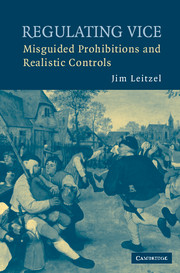Book contents
- Frontmatter
- Contents
- List of tables and boxes
- Preface
- Introduction
- 1 The Harm Principle
- 2 Addiction: Rational and Otherwise
- 3 The Robustness Principle
- 4 Prohibition
- 5 Taxation, Licensing, and Advertising Controls
- 6 Commercial Sex
- 7 The Internet and Vice
- 8 Free Trade and Federalism
- Conclusions
- Appendix: Vice Statistics
- References
- Index
1 - The Harm Principle
Published online by Cambridge University Press: 06 January 2010
- Frontmatter
- Contents
- List of tables and boxes
- Preface
- Introduction
- 1 The Harm Principle
- 2 Addiction: Rational and Otherwise
- 3 The Robustness Principle
- 4 Prohibition
- 5 Taxation, Licensing, and Advertising Controls
- 6 Commercial Sex
- 7 The Internet and Vice
- 8 Free Trade and Federalism
- Conclusions
- Appendix: Vice Statistics
- References
- Index
Summary
When and how should the government (or society, more generally) intervene in the activities of individuals, and when should individuals go about their business free of government constraint?
The pioneering text addressing this issue is On Liberty, written by John Stuart Mill and published in 1859. Mill gave a simple answer to the question of the propriety of social compulsion, one that has become known as the “harm principle”:
… the only purpose for which power can be rightfully exercised over any member of a civilised community, against his will, is to prevent harm to others. His own good, either physical or moral, is not a sufficient warrant.
Social coercion exercised over you for your own well-being, in the absence of “harm to others,” is a violation of your individual liberty. Of course, Mill quickly offers the necessary child-excluding qualification, “that this doctrine is meant to apply only to human beings in the maturity of their faculties.”
Mill noted that, in the absence of a general principle, society was apt to intervene in individual decision making in circumstances where the intervention would likely be unhelpful and to fail to intervene when intervention was merited. The harm principle is useful in part because its application in most cases accords well with the intuitions developed in liberal democracies. For instance, under the harm principle, the government has no business regulating what color I paint my living room, but society does have an interest in ensuring that my children are protected against abuse and have access to education.
- Type
- Chapter
- Information
- Regulating ViceMisguided Prohibitions and Realistic Controls, pp. 19 - 34Publisher: Cambridge University PressPrint publication year: 2007



